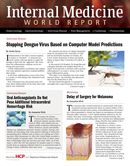Study Highlights Issues with Antireflux Surgery
A study in JAMA Surgery identified several factors that cause a frequently used antireflux surgery to be unsuccessful.

A study in JAMA Surgery identified several factors that cause a frequently used antireflux surgery to be unsuccessful.
A highly effective treatment for gastroesophageal reflux disease (GERD), only 10 to 20% of patients who undergo a laparoscopic fundoplication subsequently experience a recurrence of symptoms and 3% to 6% of patients require a second procedure, the authors cited.
However, MArco G. Patti, MD, Director of the Center for esophagel Diseases at The University of Chicago Medicine and his colleagues reviewed evidence relating to laparoscopic antireflux surgery, and identified knowedge gaps and opportunitie for improvement.
In doing so, the authors found 3 areas that determined the surgery’s failure which included: incorrect indications to conduct the operation, wrong preoperative assessments, and not using the correct techniques during the surgery.
Primarily, the team found GERD patients whose symptoms are not mitigated by therapy, experience bloating or epigastric pain, and have normal preoperative ambulatory pH levels are not optimal candidates for laparoscopic antireflux surgery.
“Conversely, in patients with new GERD symptoms that coincide with weight gain, who do not meet the criteria for morbid obesity, and who have failed lifestyle modifications (e.g., diet modification and weight loss), a fundoplication is appropriate with no specific body mass index cutoff below the threshold of morbid obesity,” investigators recommended.
Citing issues with inadequate information prior to surgery, the authors also pressed for physicians to have documentation of patients’ barium swallow, upper endoscopy, esophageal manometry, and ambulatory pH monitoring. However, in GERD patients eligible for the procedure, they cited evidence that recommended a gastric emptying study and combined multichannel impedance pH should be performed in patients who are undergoing antireflux surgery.
“Still, many believe that GERD can be securely diagnosed by the clinical history and an upper endoscopy only and that additional tests are not necessary. However, many studies have shown that even typical symptoms, such as heartburn and regurgitation, have low accuracy, leading to a wrong diagnosis of GERD in 30% to 50% of patients,” Patti and his co-authors cautioned.
Furthermore, the researchers identified measures taken during surgery which could positively affect outcomes, including optimal choice of wrap, dissecting 3 to 5 cm of esophagus without diaphragm tension, and using the “shoeshine maneuver” when bringing the stomach around the esophagus and gastroesophageal junction.
“Its [laparoscopic antireflux surgery] success is based on careful patient selection that takes into account a thorough preoperative evaluation and on the performance of a fundoplication that respects the key technical elements,” the investigators deduced. “Patients who are still symptomatic postoperatively must be thoroughly evaluated to identify the cause of failure, and treatment must be individualized.”
